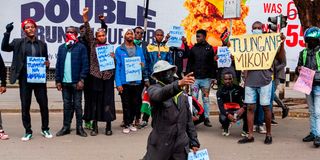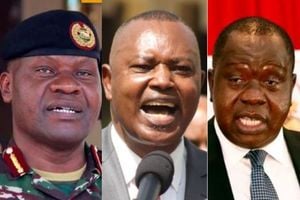Dalliance with the West made Ruto unpopular

Protesters during the anti-government protests along Kimathi Street in Nairobi on July 16, 2024.
What you need to know:
- President Ruto and his advisors may have underestimated the voices of many disgruntled Kenyans.
- As expected, the protests aftermath is likely to strain the relationship between Kenya and the IMF.
When he took office in September 2022 President William Ruto knew the task before him was not easy, but it is unlikely he would have anticipated sacking his Cabinet in less than two years.
Before the current protests, President Ruto had been invited as state guest in the US by President Joe Biden, the first such visit by an African head of state in 15 years.
Kenya had earlier accepted to lead a United Nations sanctioned multinational security support operation in Haiti. This led the US to designate Kenya as a Major Non-Nato Ally, the only country in sub-Saharan Africa to enjoy such status.
Although Kenya’s profile was rising globally, there was domestic disquiet, as many perceived the President as one prioritising foreign relations over pressing domestic issues.
Things would quickly deteriorate at home, culminating in the June 25 breach of Parliament that turned tragic.
Disgruntled Kenyans
While the circumstances that led Kenya to this point are not entirely the President’s fault, he and his advisors may have underestimated the voices of many disgruntled Kenyans who were struggling to make ends meet.
As a president keen to ensure that Kenya does not default on its external debts, he embarked on an ambitious fiscal and monetary policy, aided by the International Monetary Fund (IMF) with a view to steer Kenya out of the debt trap and to reduce Kenya’s foreign debt.
In this arrangement, IMF would help Kenya navigate its debt management crisis, by extending short-term loans to plug its foreign exchange and budgetary deficits.
While the plan had shown signs of progress made as demonstrated by reduced inflation and the strengthening of the Kenyan shilling against the dollar, it came with a heavy political price in the name of Gen Z-led anti-Finance Bill protests that have forced the President to sack his Cabinet.
Unpopular IMF-led reforms
Although the IMF-led reforms may have been necessary, they are often accompanied with unpopular conditions, mainly targeting reduced social spending, privatisation of state enterprises, elimination of subsidies and increased taxes.
It is indeed these IMF conditions that have made him increasingly unpopular, with many accusing him of abandoning his bottom-up manifesto that sought to empower the most vulnerable in society.
The President prioritised the unpopular IMF-led reforms over politics and he has unfortunately paid a heavy political price, which sadly turned tragic as Kenyan protesters needlessly lost lives.
That notwithstanding, it is important to bear in mind that the IMF and World Bank do not necessarily have Kenya’s interests at heart, and are simply capitalists keen on making profit through lending.
As expected, the protests aftermath is likely to strain the relationship between Kenya and the IMF, and the President is likely to be selective on the lender’s conditions to avoid unpopular reforms.
Dr Kirui, PhD, is a lecturer at the University of Eldoret. [email protected]





